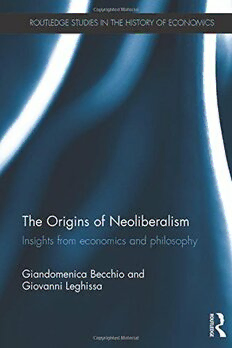
The Origins of Neoliberalism: Insights from economics and philosophy PDF
Preview The Origins of Neoliberalism: Insights from economics and philosophy
The Origins of Neoliberalism Neoliberalism is a doctrine that adopts a free market policy in a deregulated political framework. In recent years, neoliberalism has become increasingly prominent as a doctrine in Western society, and has been heavily discussed in both academia and the media. In The Origins of Neoliberalism, the joint effort of an economist and a philosopher offers a theoretical overview of both neoliberalism’s genesis within economic theory and social studies as well as its development outside academia.Tracingthesourcesofneoliberalismwithinthehistoryofeconomic thought, thebookexploresthedifferencesbetweenneoliberalism andclassical liberalism.Thisbook’saimistomakeclearthatneoliberalismisnotanatural development of the old classical liberalism, but rather that it represents a dramatic alteration of its original nature and meaning. Also, it fights against the current idea according to which neoliberalism would coincide with the triumph of free market economy. In its use of both the history of economics and philosophy, this book takes a highly original approach to the concept of neoliberalism. The analysis pre- sented here will be of great interest to scholars and students of history of economics, political economy, and philosophy of social science. Giandomenica Becchio is Assistant Professor of Economics at the University of Turin, Italy. Giovanni Leghissa is Assistant Professor of Philosophy at the University of Turin, Italy. Routledge Studies in the History of Economics Forafulllistoftitlesinthisseries,pleasevisitwww.routledge.com/series/SE0341 183 Ricardo and the History of Japanese Economic Thought A selection of Ricardo studies in Japan during the interwar period Edited by Susumu Takenaga 184 The Theory of the Firm An overviewof the economic mainstream Paul Walker 185 On Abstract and Historical Hypotheses and on Value-Judgments in Economic Sciences CriticalEdition,withanIntroductionandAfterwordbyPaoloSilvestri Luigi Einaudi Edited by Paolo Silvestri 186 The Origins of Neoliberalism Insights from economics and philosophy Giandomenica Becchio and Giovanni Leghissa 187 The Political Economy of Latin American Independence Edited by Alexandre Mendes Cunha and Carlos Eduardo Suprinyak 188 Economics as Social Science Economics imperialism and the challenge of interdisciplinary Roberto Marchionatti and Mario Cedrini 189 Jean-Baptiste Say and Political Economy Jean-Baptiste Say Edited by Gilles Jacoud 190 Economists and War A heterodox perspective Edited by Fabrizio Bientinesi and Rosario Patalano The Origins of Neoliberalism Insights from economics and philosophy Giandomenica Becchio and Giovanni Leghissa K ~~o~;J~n~~~up ORKYOR LONDOLNLOONNDDOONN Y LONDONANDNEWYORK Firstpublished2017 byRoutledge 2ParkSquare,MiltonPark,Abingdon,OxonOX144RN andbyRoutledge 711ThirdAvenue,NewYork,NY10017 RoutledgeisanimprintoftheTaylor&FrancisGroup,aninformabusiness ©2017GiandomenicaBecchioandGiovanniLeghissa TherightofGiandomenicaBecchioandGiovanniLeghissatobeidentified asauthorsofthisworkhasbeenassertedbytheminaccordancewith sections77and78oftheCopyright,DesignsandPatentsAct1988. Allrightsreserved.Nopartofthisbookmaybereprintedorreproducedor utilisedinanyformorbyanyelectronic,mechanical,orothermeans,now knownorhereafterinvented,includingphotocopyingandrecording,orin anyinformationstorageorretrievalsystem,withoutpermissioninwriting fromthepublishers. Trademarknotice:Productorcorporatenamesmaybetrademarksor registeredtrademarks,andareusedonlyforidentificationandexplanation withoutintenttoinfringe. BritishLibraryCataloguinginPublicationData AcataloguerecordforthisbookisavailablefromtheBritishLibrary LibraryofCongressCataloginginPublicationData Names:Becchio,Giandomenica,author.|Leghissa,Giovanni,1964-author. Title:Theoriginsofneoliberalism:insightsfromeconomicsandphilosophy /GiandomenicaBecchioandGiovanniLeghissa. Description:NewYork:Routledge,2017.|Includesindex. Identifiers:LCCN2016018993|ISBN9780415732246(hardback)| ISBN9781315849263(ebook) Subjects:LCSH:Neoliberalism.|Economics--History.|Social sciences--Philosophy. Classification:LCCHB95.B3932017|DDC330.1--dc23 LCrecordavailableathttps://lccn.loc.gov/2016018993 ISBN:978-0-415-73224-6(hbk) ISBN:978-1-315-84926-3(ebk) TypesetinTimesNewRoman byTaylor&FrancisBooks Contents List of tables vii Introduction: the counter-revolution of neoliberalism 1 This book’s contents 16 1 Foucault and beyond 28 1.1 Foucault’s distinction between liberalism and neoliberalism 28 1.2 The neo-Marxist conception of neoliberalism 42 1.3 The relationship between state action and economy 52 1.4 Neoliberalism and the question of systemic complexity 59 2 The building of economics as a science 77 2.1 The revolution of marginalism: how political economy became economics 78 2.2 General economic equilibrium and econometrics in the 1930s: from Vienna to Chicago 86 2.3 The Americanization of the discipline: building mainstream economics 90 2.4 The rise of neoliberalism in Chicago: the hegemonic role of both neoliberalism and neoclassical economics 94 3 The building of individuals as rational agents 113 3.1 Economic rationality and homo oeconomicus: from Vienna and Lausanne to Chicago 114 3.2 The theoretical and methodological distance between Vienna and Chicago 119 3.3 Karl Polanyi’s critique of neoliberalism 126 vi Contents 4 Turning the world into a firm 146 4.1 Neoliberalism and the political role of the firm 146 4.2 The neoliberal theory of organizations 162 4.3 Institutions, evolution and the frame of individual choices: or, farewell from the neoclassic nuts and bolts 172 Postscript: a new ethics for a new liberalism? 193 Index 201 Tables 3.1 Classical liberalism versus neoliberalism 125 3.2 Austrian versus Chicago school of economics 126 This page intentionally left blank Introduction The counter-revolution of neoliberalism Neoliberalism has been defined as a political doctrine that basically adopts a free market in a deregulated political framework.1 Lately many publications have been dealing with a rethinking of neoliberalism in abroader perspective as a ‘collective’ thought (Mirowski 2009; Dean 2014) following what Weber called ‘political oriented action’, i.e. the attempt to influence or seize power (Weber [1922] 1968) by organized groups.2 WeconsiderneoliberalismastheWeltanschauungofthelatetwentiethcentury whose roots are deeplygrounded in economic theoryas it has been developing in the mid-twentieth century. Neoliberalism is not a ‘vision’ (according to Schumpeter’sdefinition),whichshapesthe‘toolbox’,likeclassicalliberalism has beenforpoliticaleconomyinthenineteenthcenturyorsocialismforMarxism (Schumpeter 1954). Neoliberalism is either the marketing of neoclassical economic theory or its propaganda. Neoliberalism is based on a relatively simple principle: the interaction between the maximization of expected results givenscarcemeansandrevealedpreferences.Inasocietyruledbyaneoliberal system, economic rationality has reached primacy.3 This primacy has to be intended neither as a Marxian ‘structure’ nor as a mere pursuit of getting higher profits for capitalists. It is meant as the regular application of the logic of economics as the only rational way of organizing private lives as well as politics and the public sphere. In this book both historyof economics and philosophy will be used to help with a new interpretation of neoliberalism. This book’s aim is to show the link between neoclassical economics (we will be using the terms ‘neoclassical economics’ and ‘mainstream economics’ as synonymous throughout the book) and neoliberalism as the most persuasive cultural doctrine of our time (Mirowski 2013). Numerous publications have appeared latelyon the nature of neoliberalism spreading from academia to the press, involving social scientists as well as journalists and opinion makers. The literature on the making of mainstream economics is also quite vast, especially amongst economists and historians of economics.Thisbookrepresentsatentativeapproachtohowtoconsiderneoli- beralism as deeply rooted and developed within the process of emergence of a particular way of thinking about political economy as a science (neoclassical
